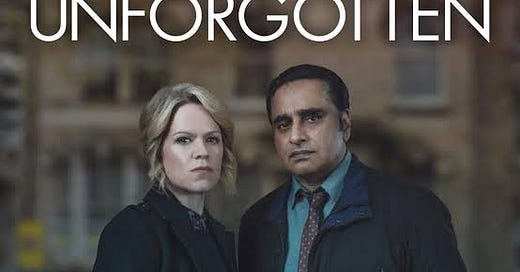The world of crime fiction – on screen and page – revolves around two central themes: How do we know what’s true, and how can we achieve justice? For the writer, the former generates the plot, the latter the development of character.
Season 6 of the British crime procedural “Unforgotten,” a series involving cold cases that suddenly heat up, brings detectives whose personal characters already established – if we viewers haven’t forgotten them during the two years since Season 5. The plot follows well established patterns: A dead body – or rather body parts – turn up in marshland east of London. Created and written by Chris Lang and produced for ITV, it’s the latest installment of a series running since 2015.
While some pieces of this victim-puzzle have deteriorated beyond the point of recognition, a leg is still wrapped in black plastic and almost as good as new. At least to the pathologist. It reveals the first aspect of the victim – his identity. His character – with many more flaws than virtues – unfolds before us through the investigation and flashbacks. Suspects are numerous, each problematic in various ways. Each gives us viewers good reasons for sympathy, especially because the victim is, well, justly dead. A bit further than half-way through the concluding episode, and after the usual half-dozen false starts, truth emerges. So far, so ordinary.
But the hitch is this – and it’s hard to discuss without giving a hint (thus, a half-spoiler alert) that the truth is unpalatable, for the viewers and even more so for the detectives. We viewers could just face it, go away to ponder how obeying the law can bring about injustice. The detectives face a dilemma, however: By solving the case they will make themselves perpetrators of injustice.
Rather than revealing the outcome – of the murder and the writer’s solution to the detectives’ dilemma – let’s think a bit about what law is, and how it might not serve the cause of justice.
I’ve often said – and occasionally written – that law is best viewed as the current, socially-acknowledged approximation of ethics. We obey the law, generally, for the sake of social order. We violate the law at personal peril. But ethical imperatives may demand that we violate the law for the sake of justice even if it’s against social order.
Others have said similar things, each set of definitions with its own nuances. Here’s one such view:
Law is a formal system of rules enforced by governmental institutions. The law’s objective is to maintain social order, protect rights, and promote justice.
Justice, after all, is a product of moral values, and it is evident that legal standards and legal systems need to promote justice. However, promoting justice is just one of the goals of the legal system; other goals include maintaining social order and supporting social institutions. (Ilan Fuchs, American Public University)
On this view, justice is an outcome of ethics, but with an added twist towards social order. Which may involve the unethical or immoral, depending on who is setting the law, and with whose notion of order in mind. A second:
Ethics and law are the different forms of rules by which humans are expected to behave themselves in the society. Ethics represents [an] internal system of controls, and Law refers to an external mechanism of control. Both these controls are essential for optimal behavior, which includes seeking and dispensing treatment. (Gundugurti, et al., Indian Journal of Psychiatry)
On this view, law is a social construct; ethics is a personal determination of justice. And a third:
Existing studies of the legal profession often argue that changing conditions in law have led to a “constrained morality” and an “erosion of ethos” among lawyers. While the current study acknowledges shifts in lawyers’ ethos, it challenges the claim of an erosion or “lack” of morality. (Loacker, Journal of Business Ethics)
In this author’s judgment, seeming unethical behavior by lawyers may involve following the law to evade justice. But it acknowledges that lawyers have a second, professional imperative of ethics. It may bind a lawyer to pursue the client’s interest, within society’s definitions as constituted in law, even when personal ethics tells us (and them) that justice lies elsewhere.
In “Unforgotten” (and with a second half-spoiler alert), justice is served, and law is reconciled with it. Harmony is restored. All is well, again. Sleep comfortably. But in this cop show, isn’t that a cop-out?
Watch it – and ponder.





There is of course a legal concept—ex aequo et bono—which suggests that what is right and good in a particular case may not be precisely what the law recommends. Judges have discretion to introduce this concept into their courtrooms to compensate for what may be seen as cold and insufficient remedies under written law. In theory, this defends the vulnerable and offers litigants a chance to settle their differences in a reasonable compromise. But it’s never easy reaching agreement on what is right or good. It’s hard enough to agree on what is true. And that reality, as you say, has been a staple of drama and crime fiction for years. Depending on the skill of a particular writer, this concept can form the basis of quite interesting ethical, social, existential, and dramatic questions. I think of Terence Rattigan's "The Winslow Boy" for example. Or the great Paul Newman film "The Verdict."